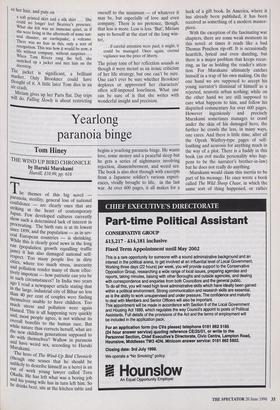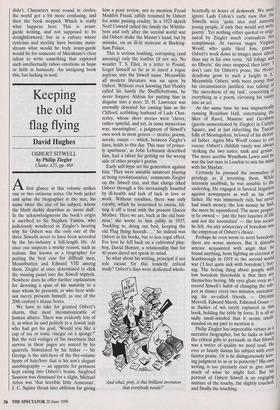Yearlong paranoia binge
Tom Hiney
THE WIND UP BIRD CHRONICLE by Haruki Murakami Harvill, £10.99, pp. 616 The themes of this big novel paranoia, sterility, general loss of national Confidence — are clearly ones that are striking at the heart of contemporary Japan. Few developed cultures currently show such a determined lack of interest in procreating. The birth rate is at its lowest since 1899, and the population — as in sev- eral European countries — is shrinking. While this is clearly good news in the long run (population growth equalling traffic Jams) it has also damaged national self- respect. Too many people live in dirty cities, where too much stress, insecurity and Pollution render many of them effec- tively impotent — how patriotic can you be in such circumstances? In India two years ago I read a newspaper article stating that in the large, industrial city of Bihar no less than 40 per cent of couples were finding themselves unable to have children. Too much stress and pollution were again blamed. This is all happening very quickly and, most people agree, is not without its overall benefits to the human race. But While nature thus corrects herself, what are the new childless generations supposed to do with themselves? Wallow in paranoia and have weird sex, according to Haruki Murakami.
The hero of The Wind-Up Bird Chronicle (though one senses that he should be unlikely to describe himself as a hero) is an out of work young lawyer called Toni Okada. He has left what was a boring job and his young wife has in turn left him. So he drinks beer, sits at the kitchen table and begins a yearlong paranoia binge. He wants love, some money and a peaceful sleep but he gets a series of nightmares involving rejection, dismemberment, and weird sex. The book is also shot through with excerpts from a Japanese soldier's various experi- ences, vividly brought to life, in the last war. At over 600 pages, it all makes for a heck of a gift book. In America, where it has already been published, it has been received as something of a modern master- piece. With the exception of the fascinating war chapters, there are some weak moments in this novel: at times it reads like a bad Thomas Pynchon rip-off. It is occasionally heartfelt, lyrical and even dazzling, but there is a major problem that keeps recur- ring, as far as holding the reader's atten- tion. For Murakami ultimately catches himself in a trap of his own making. On the one hand we are supposed to accept his young narrator's dismissal of himself as a rejected, neurotic urban nothing; while on the other hand we are still supposed to care what happens to him, and follow his dispirited commentary for over 600 pages. However ingeniously and precisely Murakami sometimes manages to crawl under the skin of his damaged hero, the further he crawls the less, in many ways, one cares. And there is little time, after all the Oprah Winfrey-type pages of self- loathing and neurosis for anything much in the way of a plot. There is a baddy in this book (an evil media personality who hap- pens to be the narrator's brother-in-law) but he does not really do anything.
Murakami would claim this inertia to be part of his message. He once wrote a book called The Wild Sheep Chase, in which the same sort of thing happened, or rather didn't. Characters went round in circles, the world got a bit more confusing, and then the book stopped. Which is really what happens here. This is avant- garde writing, and not supposed to be straightforward, but in a culture, where cynicism and sterility have become main- stream what would be truly avant-garde would be for someone of Murakami's clear talent to write something that explored such intellectually taboo emotions as hope or faith in humanity. An intriguing book this, but lacking in soul.



























































 Previous page
Previous page